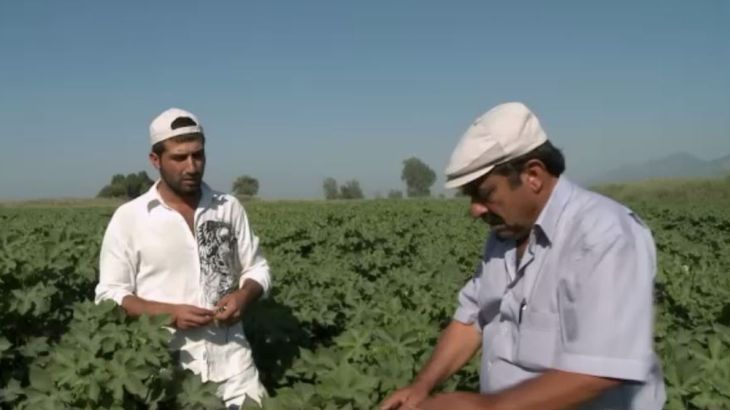
The Last Villagers of Avsar
An insight into a rural community in western Turkey which is losing its livelihood, population and hope for the future.
Filmmaker: Koray Caliskan
Avsar is a small village in south-western Turkey which, like many rural communities around the world, is gradually losing its livelihood, its population and much of its hope for the future.
Keep reading
list of 4 itemsWhy are British farmers pleading for a universal basic income?
Why are some US food producers using antibiotics in meat again?
Photos: Chocolate prices rise as West Africa’s cocoa crisis deepens
It has depended on cotton farming for decades, but times have changed. Turkey’s agriculture used to be the biggest contributor to the country’s economy and in the 1920s, farm labourers formed three-quarters of the workforce, but now they are under a quarter.
Industrialisation and urbanisation occurred later in Turkey than in Western Europe but had a major impact on farming communities starting in the 1950s.
The cost of growing cotton has increased and made it hard for Avsar’s working poor to make ends meet. Many villagers have abandoned farming and left for the city, so the population has dropped from 2,000 to 650 in the past 40 years – most of whom are elderly adults.
Gradually, our population will shrink even more through migration, deaths and lower birth rates. I think we'll be the last remaining villagers of Turkey.
For grocery store owner Ali Kose, it is becoming increasingly difficult to keep his shop open. Hundreds of customers used to frequent his shop, but “now it’s dropped to only 150 and there are fewer every day,” he says.
“Young people go to [the town of] Soke all the time. The unemployed also leave to look for jobs, and parents go with their kids who study at city schools. This village can last another six or seven years. I know I also have to move. There’ll be no reason for me to stay here,” says Kose.
The problem for cotton farmers is that the price of cotton has steadily fallen over time, while production costs have increased.
Between 2000 and 2015, the price of diesel has increased by almost 40 percent. And while the government provides diesel subsidies for farmers depending on the crop they cultivate, it is still not enough.
Farmer Medine Goger says: “When this tractor goes back and forth 40 times it uses $600 of fuel …. You spend $1,700 of your profit on fuel. If you sell the cotton for 30 cents a kilo, it spells ‘suicide’ for the farmer.”
Village mechanic Halil Kanyis tries to help out the farmers as much as he can, but businesses like his are also on the decline. When farmers can’t afford a wheel change for a puncture, “we patch it instead. They try to make do with it, so our business suffers too. But we can’t hold on for long if it goes on like this,” he says.
Turkish commentator Murat Guvenc of Istanbul Sehir University believes that rural spaces in Europe will ultimately be economically and socially unsustainable, and that Turkey’s village communities will continue to empty, but in some regions small settlements will continue labour-intensive farming in family businesses.
“Gradually, our population will shrink even more through migration, deaths and lower birth rates. I think we’ll be the last remaining villagers of Turkey,” says Medine Goger.
The Last Villagers of Avsar is a snapshot of life in rural Turkey, which also reflects the continuing decline in rural communities worldwide.